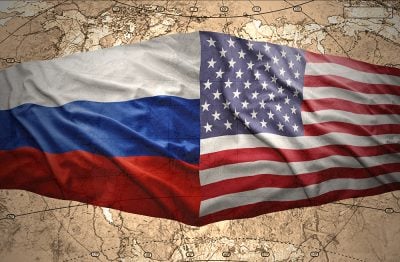Russia Responds Weakly to Expulsion of Its Diplomats

As expected, the response was tit-for-tat – 60 US diplomats expelled, as well as closure of Washington’s St. Petersburg consulate, along with a mirror response to staff deported by other countries.
Days earlier, Moscow expelled 23 UK diplomats, responding in kind to British March 14 expulsions.
Separately on Thursday, Russian Foreign Ministry spokeswoman Maria Zakharova minced no words, saying “(w)e realize the strength of…London and Washington…pressure…and we don’t have any doubts (that) they synchronized their actions in the NATO and EU formats” – forcing their allies to act in unison with them, adding:
“We do understand how inhumane that pressure was, as they exploited the principles of solidarity and implementation of a unified foreign policy course.”
“London and Washington are the beneficiaries of (the Skripal incident) and the expulsion of diplomats that followed it.”
In responding to unacceptable US/UK actions, Russia didn’t go far enough, showing weakness, not strength, leaving itself vulnerable to further hostile measures likely coming, possibly more extreme than already, a slippery slope toward possible nuclear war.
The only language Washington and Britain understand is force. Russia has lots of options.
Straightaway it should have expelled US and UK ambassadors, along with most of their diplomatic staff, permitting only a barebones presence in the country to remain.
It should demand illegal US occupation of Syrian territory end, along with its terror-bombing halted, massacring civilians, destroying vital infrastructure on the phony pretext of combatting ISIS Washington created and supports.
As long as an illegal US presence in Syria remains, along with Pentagon-led aggression and support for anti-government terrorists, conflict resolution will remain unattainable. Endless war will continue, perhaps for another seven years or longer.
Diplomacy with Washington is futile, accomplishing nothing, encouraging greater US hostility, including endless aggression in Syria.
Russia should warn Washington and Britain, strongly stating it no longer will tolerate their unacceptable actions – against Moscow, Syria, its people, sovereignty and territorial integrity.
Washington and Britain are bullies, targeting nations unable to match their military strength.
Russia is another story entirely, its super-weapons unmatched by any other countries.
Is it enough to give Washington and Britain pause about attacking its heartland?
Are both countries unlikely to strike a nation able to give as much or more than it takes in direct confrontation?
Street bullies prefer unfair fights favoring them. Are Washington and Britain similar – likely to back off for now at least, taking time to re-strategize, knowing Russian military might if unleashed can turn their cities to irradiated rubble?
These are unanswered questions, crucial ones. The risk of nuclear war remains uncomfortably high – by accident or design.
Washington’s rage for global dominance likely assures an eventual showdown.
It’s to Russia’s advantage to risk a minor confrontation rather than a possible nuclear one, devastating all parties involved, maybe humanity with it.
Giving bullies a black eye or bloody nose most often gets them to back off. The same strategy can work with nations – whether true for Washington and Britain an unknown.
Since the atom was split, America never attacked a nation of equal military strength, notably not a nuclear armed one.
Russia wants world peace and stability, not war. Perhaps the only way to achieve it is by refusing to be pushed around any longer – making reasonable demands, insisting they be complied with, intending tough punishment otherwise.
Believing today’s storm will pass, rapprochement with the West one day possible is banking on what never was and won’t be ahead as long as Washington wants global dominance pursued by transforming all sovereign independent countries into subservient vassal states – especially Russia and China.
That’s what a Sino/Russia alliance must prioritize to stop.
The strategy I favor is high-risk. Responding weakly to hostile actions threatening their security, amounting to appeasement or close to it, I believe is higher risk.
Stephen Lendman is a Research Associate of the CRG, Correspondent of Global Research based in Chicago.
VISIT MY NEW WEB SITE: stephenlendman.org (Home – Stephen Lendman). Contact at [email protected].
My newest book as editor and contributor is titled “Flashpoint in Ukraine: How the US Drive for Hegemony Risks WW III.”

